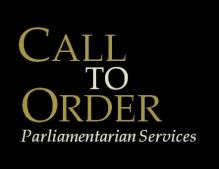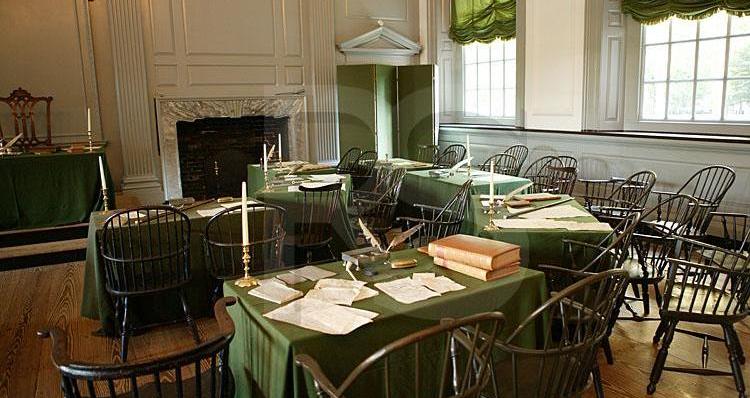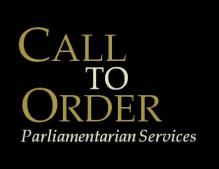In Mr. Smith Goes to Washington, the naïve Mr. Smith yields the Senate floor out of courtesy to a colleague, In doing so he loses his ability to debate on his legislation to prevent graft and corruption, Mr. Smith learned the hard way about the importance of knowing procedural rules. Officers and members of boards and and associations need to know the rules of order to achieve their goals and help their enterprises succeed. Our expertise includes:
- Meeting and Session Governance Services
- Presiding Officer Services
- Delegate Convention or Assembly Services
- Strategic Procedural Planning Services
- Bylaw Drafting, Review, and Revision Services
- Written Opinions Services
- Training Programs
Call out the sheriff! Legislators on the lamb!
Madison, WI -- Wisconsin Republican Governor Scott Walker needs to balance the budget, and he wants to do it by cutting spending and eliminating certain collective bargaining procedures of various government unions. His budget bill is being taken up by the Wisconsin State Senate where Republicans hold the majority of 19 to 14. But, fiscal bills require a quorum of three-fifths (60%) of the Senate members or 19.8 rounded to 20. Democrats have fled the state of Wisconsin to prevent a vote from being taken that they know they will lose.
The State Republican Senator Scott Fitzgerald made a motion for a call of the Senate. The motion for a call of the house in general parliamentary procedure requires, if adopted, the Sergeant at Arms lock to the doors of the assembly, after which a roll call is taken to find out who is present and more importantly who is absent without excuse. Those who are absent without excuse can be arrested and brought to the assembly. Generally, legislative bodies are the only types of assemblies that have the power to enforce a motion for a call of the the house. The Wisconsin State Senate has this authority. So now, 14 Democrat Senators are on the lamb and generally believed to be in Illinois.
The last time I can remember this happening was in Texas in 2004 when the Texas legislature was about to take a vote on the redistricting plan put together by the Republican controlled legislature. The Democrat members of the Texas legislature fled to Louisiana to prevent a quorum from being present and thereby stalling the plan from being implemented. (Needless to say, if the plan were implemented Democrats stood to lose some seats.) The Texas Rangers gathered up a posse to round up the fleeing legislators. You can't help but chuckle at the thought of a posse of Texas Rangers on horses chasing down those delinquent legislators!
The mere fact that a motion for a call of the house exists says something about us humans and the lengths that we're willing to go to have our way. Back at our nation's founding, one of the charges against King George in the Declaration of Independence was that "HE has called together Legislative Bodies at Places unusual, uncomfortable, and distant from the Depository of their public Records, for the sole Purpose of fatiguing them into Compliance with his Measures." Of course this was considered unfair. I wonder what the founders would say of the actions of either of the Wisconsin Democrats or the Texas Democrats?

© 2011 - 2014 Call To Order Parlimentarian Services
In the News
Independence Hall, Philadelphia,PA is where the Second Continental Congress debated and passed the Declaration of Independence, and where the Constitutional Convention debated and adoped the U.S. Constitution.

| Join Our Mailing List |
In Mr. Smith Goes to Washington, the naïve Mr. Smith yields the Senate floor out of courtesy to a colleague, In doing so he loses his ability to debate on his legislation to prevent graft and corruption, Mr. Smith learned the hard way about the importance of knowing procedural rules. Officers and members of boards and and associations need to know the rules of order to achieve their goals and help their enterprises succeed. Our expertise includes:
- Meeting and Session Governance Services
- Presiding Officer Services
- Delegate Convention or Assembly Services
- Strategic Procedural Planning Services
- Bylaw Drafting, Review, and Revision Services
- Written Opinions Services
- Training Programs
Elections, Fair and Square!
Election day is here! One of the greatest blessings we have is to be able to go the voting booth, generally unhindered, and vote to choose those who will represent us in the U.S. Congress and, in most states, those that will represent us in state legislatures, and governors’ offices.
We have trust that our elections will be free and fair. Of late the question of fairness has become acute with reports and glaring examples of voter fraud. (See Who’s Counting, by John Fund and Hans Von Spakovsky). Having trust that our elections are fair is fundamental to our government. It is no less so for private associations.
While there may be many contributing factors, the fundamental principle that only those eligible to vote may vote is critical to fair elections and voting in general. The bylaws set forth the standards for eligibility to vote. Such standards may include certain classes of membership that have voting rights while other classes do not or whether a member in arrears in dues or other assessments maintains voting rights. If proxy voting is allowed, the bylaws must have specific provisions and procedures to maintain integrity.
Most importantly, Robert’s Rules of Order Newly revised and the Standard Code of Parliamentary Procedure both state that voting rights may depend on whether any disciplinary measures are pending. Thus, the category of a “member in good standing” arises. A member in good standing is a member who maintains all the rights and privileges of membership. Bylaws should identify what triggers a loss of a right or privilege and how it is restored. Voting is, of course, one of the fundamental rights of membership.
For delegate assemblies, such as would occur with large organizations with many affiliate or chartered subsidiaries geographically scattered, the delegates must be properly chosen and the parent organization properly notified of the delegates chosen in order to vote. This typically takes a considerable amount of administrative work to collect and confirm delegate information.
With the bylaws specifying voting requirements, an organization must then take on the task of assuring that only members allowed to vote are those defined in the bylaws. For small organizations, this generally is very simple. For larger organizations or delegate assemblies membership lists or delegate lists must be maintained and present with a check-in process to assure that only members get voting credentials. This task is generally delegated to the secretary or a credentials committee to assure that all of the work is done.

In the News
Independence Hall, Philadelphia,PA is where the Second Continental Congress debated and passed the Declaration of Independence, and where the Constitutional Convention debated and adoped the U.S. Constitution.
